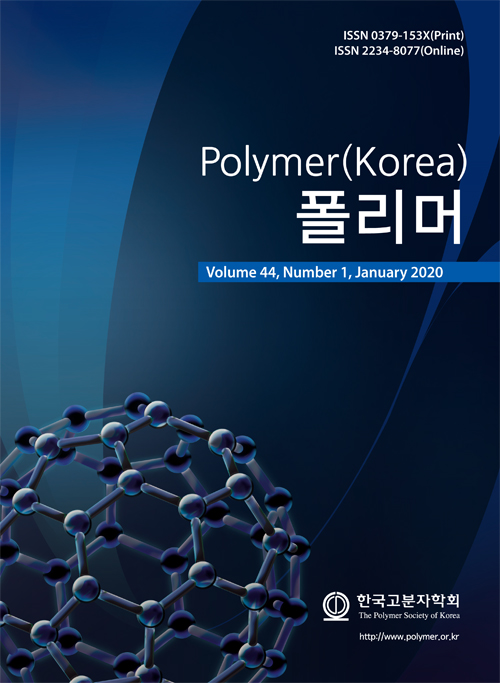- Preparation and Properties of Thiol-ene UV-Photopolymerized Nanocomposites Using Cellulose Nanocrystals (CNCs) with Thiol Groups as Fillers
Department of Chemical Engineering, Keimyung University, Daegu 42601, Korea
- 셀룰로오스 나노결정 표면에 Thiol기가 도입된 충전제를 이용한 Thiol-ene UV 광중합 나노복합체 제조 및 물성에 대한 연구
계명대학교 공과대학 화학공학과
In this study, thiol groups
were introduced on the surface of cellulose nanocrystal (CNC) by silanization
using (3-mercaptopropyl)trimethoxysilane (MPTS). Nanocomposites comprising of
acrylate resin and fillers, such as pristine CNC and MPTS-modified CNC (CNC-MPTS),
were prepared to study the effect of surface-modified CNC on various
thermomechanical properties. Comparing the Tg and modulus of
the nanocomposites with the 5 wt% pristine CNC and the CNC-MPTS fillers to
UV cured resin without filler, this study confirmed an increase in Tg
by 7.4 and 10.4 ℃, and improvement in modulus by 1.33 and 2.06
times by dynamic mechanical analyzer (DMA) and universal testing machine (UTM),
respectively
본 연구에서는
cellulose nanocrystal(CNC)를 개질하기 위해 (3-ercaptopropyl)trimethoxysilane(MPTS)를
사용하여 실란화 반응을 통해 CNC 표면에 티올기(-SH)를
도입하였다. 개질된 CNC가 나노복합체에 미치는 영향을 연구하기
위하여, 순수 CNC와
MPTS로 개질된 CNC(CNC-MPTS)를 충전제로 사용하여 acrylate계 수지와 thiol-ene 광중합법으로 나노복합체를
제조하였다. 순수 CNC 및 CNC-MPTS를 5 wt% 사용한 나노복합체의 Tg와 인장강도를 순수 수지 중합체와 비교하면, Tg는 7.4 및 10.4 ℃ 증가하고, 탄성률은 1.33 및 2.06배 증가하는 것을 동적기계분석기(DMA) 및 만능재료시험기(UTM) 측정으로 각각 확인하였다
Keywords: cellulose nanocrystal, (3-mercaptopropyl)trimethoxysilane, surface modification, thiol-ene photopolymerization, mechanical property
- Polymer(Korea) 폴리머
- Frequency : Bimonthly(odd)
ISSN 0379-153X(Print)
ISSN 2234-8077(Online)
Abbr. Polym. Korea - 2023 Impact Factor : 0.4
- Indexed in SCIE
 This Article
This Article
-
2020; 44(1): 99-108
Published online Jan 25, 2020
- 10.7317/pk.2020.44.1.99
- Received on Oct 17, 2019
- Revised on Nov 14, 2019
- Accepted on Nov 14, 2019
 Correspondence to
Correspondence to
- KiRyong Ha
-
Department of Chemical Engineering, Keimyung University, Daegu 42601, Korea
- E-mail: ryongi@kmu.ac.kr









 Copyright(c) The Polymer Society of Korea. All right reserved.
Copyright(c) The Polymer Society of Korea. All right reserved.